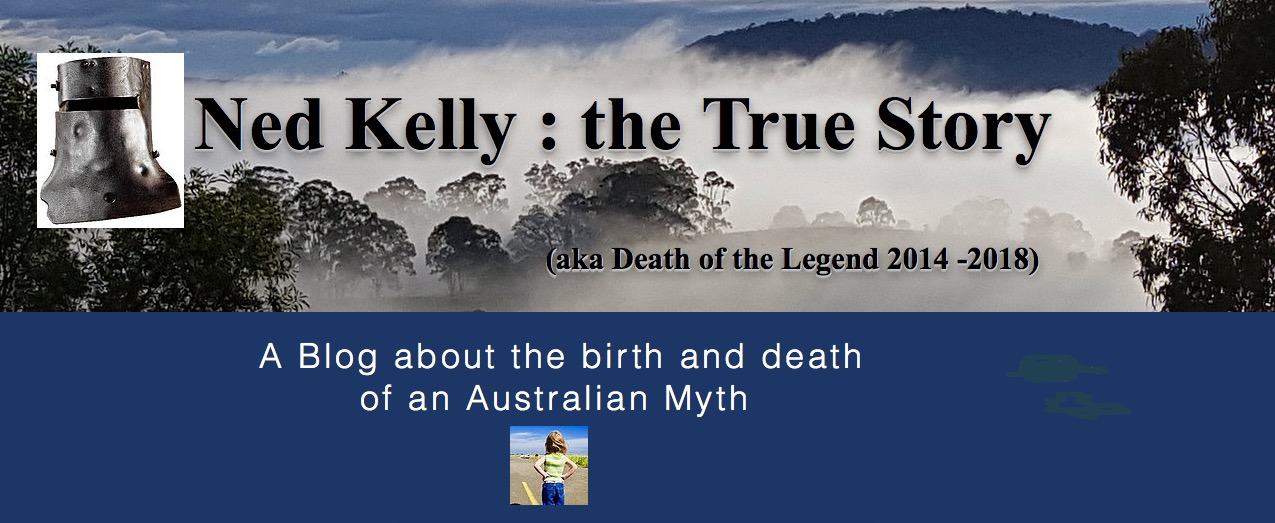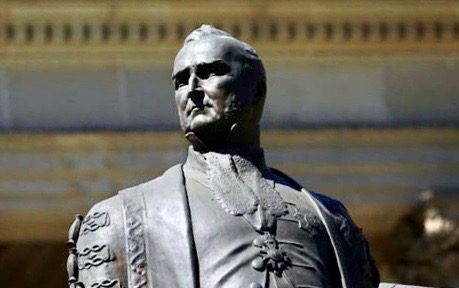 |
| What Ned Kelly's uncle did to his sister Margarets face was much WORSE than this! |
The image Kelly
sympathisers want you to have in your minds of the extended family of Ned Kellys aunts and
uncles as he was growing up, is that they were decent but poor country folk,
struggling to make a living in the harsh frontier environment of north-east
Victoria. They want you to believe that the authorities, corrupted by their associations with rich
landowners and their own prejudices, harassed and persecuted the Kelly ‘clan’
for being Irish, for being Catholic, for having convict associations and for
being poor selectors. The story is that having observed all this as he was
growing up, once he was old enough Ned Kelly finally decided to do something
about it.
As I showed last
week, in contrast to that treacly sweet Kelly myth of family harmony against the
dark forces lined up against them, the
plain truth is that it wasn’t the police or the squatters who caused
Ellen Kelly to be poverty stricken and a solo mother of seven in 1868. She was
a poverty-stricken widow because of her husband’s alcoholism - which killed him
in 1866 - and her brother-in-laws act of
drunken revenge, setting fire to their home and nearly incinerating 13
children. She and her two sisters lost everything, because Ellen didn’t want to
get into bed with Uncle Jim. That was his revenge.
This horrendous act
of retaliation was the kind of thing that drew police attention to the Kellys, and so it most certainly should have. They came across children sleeping outside in
the grass, women whose husbands were all in prison, stories of drunken brawling,
promiscuity and arson. The idea that police interest in the Kelly clan was harassment that had something to do with
their religion or their nationality or their convict associations is laughable –
it arose from the ghastly criminal actions of the Kellys themselves which on
that occasion very nearly resulted in tragic consequences for as many as 13
clan children. Ned Kelly could have been one of the children incinerated when
that old pub went up in flames.
Its hardly likely
that this was a one-off. Uncle Jim was said to be rarely sober so they had
probably been putting up with this drunks intolerable and boorish behaviour for a long time. They were all probably glad when the police took him off their hands and he went to
prison for fifteen years. But he wasn’t the only criminal in the clan when Ned
Kelly as growing up.
Ned had another Uncle
Jim, Jimmy Quinn, his mothers brother, and in 1872 he was involved in yet another case that Judge
Redmond Barry had to preside over at the Beechworth Circuit Court. This time
James aka ‘Jimmy’ Quinn was tried for ‘wounding
with intent to cause grievous bodily harm.’ And who did he wound you might ask? A
policeman? A squatter? A bully from the ruling class? Someone harassing and
oppressing them as they tried to go about their lawful business? That’s what
you might expect if the Kelly myths were true but no, he beat up his own younger
sister, Margaret. She was one of the poor women who lost everything when their
accommodation was burned to the ground four years earlier by the other of Neds
Uncles Jim.
In fact this incident
from January 1872 has horrible parallels with the 1868 one. They both were
about drunken clan members trying to hit on women, and seeking revenge when
they were rejected. This time, the perpetrator, James Quinn aged 32 entered Margaret
Quinns bedroom early one morning, took all his clothes off and tried to get
into bed with Jane Graham who was sleeping at the foot of Margaret’s bed. Margaret’s
husband was Patrick Quinn (same surname but different family altogether) and wouldn’t
you know it, he was in prison for violent assault.
In court the 21 year
old Jane Graham was interrogated and its recorded that “It was with difficulty any evidence could be extracted from this
witness”. At one point she is recorded as saying “I don’t remember what happened next” . This of course was long
before the day when it was realised how court processes entrench the
embarrassment and shame, and traumatise yet again the victims of sexual
assault, but its clear in that remark, that this is what was happening in court
to young Jane Graham. She has been identified as a local prostitute, but that
didn’t give Uncle Jim the right to force himself on her, so Margaret objected to his behaviour. In court Margaret
said:
“About daybreak prisoner came into the room undressed and began to pull
the clothes off the girl. She called out and I woke and told him he should be
ashamed of himself. ….. I told the girl we would get up and dress as it was daybreak. We did so when the prisoner struck me a
severe blow on the side of the head with his shut hand. It knocked me senseless
and I knew no more for some time. I do
not recollect any other blow. I was struck on the mouth. When I came around I
was lying on the floor bleeding from two wounds in the face.”
“Stephen Byrne, a labourer deposed: I know Mrs Quinns house. I recollect
going there on the morning of Saturday. I heard James Quinn say that he had
beat his sister and I went to see what was the matter about sunrise. ….She was
cut in the face and bleeding freely….I
fetched her to the doctor. She was not able to walk and my employer sent me in
with a spring cart”
In Court, Doctor W B Hutchinson said:
“She had one wound two inches long from the mouth up toward the eye, cut
right through to the mouth, and two other wounds about the lip and one on the
nose, separating the cartilage from the bones. …. She had lost a good deal of
blood.” (Click this link to read the court report yourself.(O&M April 17 1872))
This was obviously an
appalling and violent attack, the kind we refer to these days as a coward’s
punch, a massive hit to the face that felled Margaret immediately. It could
have killed her. Margaret would have looked much worse than the woman in the
photo at the top of the post, with a two-inch laceration extending right into
her mouth, her nose pulverised, blood streaming from the injuries, unable to
stand. Her young face would have been disfigured for the rest of her life.
A couple of months
earlier, that same Doctor had been in court describing the injuries this same Jimmy
Quinn had inflicted on a John Page in another violent assault. Quinn was hiding
under a bed when police came to arrest him. Page was ‘in a very bad state’ after the assault and remained in the
Wangaratta hospital for two or three weeks. And was John Page a despised
squatter, a tyrannical policeman, or oppressor from the ruling class? No, he
was a ‘splitter’, in other words a poor hard working labourer.
Quinn received two
years for this assault and then in April another eighteen months was added for
the assault on his sister.
Kelly apologists do their
best to hide this sickening episode in their history, and the many others
like it, and instead promote the claim first invented by Ned Kelly that police interest in them was
persecution and harassment, that they were targeted because they were Irish
selectors and related to convicts, that they were innocent victims. The facts show this to be an outright lie, a
fiction, a cover-up. The facts, recorded in the newspapers and Court reports of
the time prove that police interest in the Kelly clan came about because of the
Kelly clans own unquestionably criminal behaviour – sexual assault, arson, infliction
of grievous bodily harm – and shockingly, much of it on their own family
members. We know that in every case the domestic violence that makes it to court is just the tip of a putrid ice-berg, and so no doubt it touched every corner of the Kelly world. The Kelly cover-up of their wretched drunken violent treatment of women, turns the stomach, especially when they repeat their claim thier troubles were all the fault of the police..
This was the environment
that Ned Kelly grew up in – violence was the clan norm, and Ned Kelly was an
enthusiast for it, boasting in the Jerilderie letter “I had a pair of arms and a bunch of fives on the end of them that
never failed to peg out anything they came in contact with”. How utterly
unsurprising that his first criminal charge, at the age of 15, was for assault. How utterly unsurprising that his last criminal act was an attempt at ultra-violence at Glenrowan, a police massacre.


